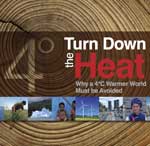 This is the five minute condensed version of the talk I gave in Gore at the Coal Action Network Aotearoa Summerfest (a somewhat optimistic title, given the chilly and wet weather last weekend).
This is the five minute condensed version of the talk I gave in Gore at the Coal Action Network Aotearoa Summerfest (a somewhat optimistic title, given the chilly and wet weather last weekend).
It’s too late to avoid damaging climate change, because it’s already happening. Weather extremes — floods, droughts, heatwaves, wildfires, and storms — are on the increase, dramatic melting of Arctic sea ice is affecting northern hemisphere weather patterns, and accelerating ice loss in Greenland and Antarctica points towards a rapid increase in sea level. And the climate commitment, the 30 years it will take the planet to get back into energy balance once atmospheric CO2 is stabilised, guarantees that we will see much worse long before we see any benefit from action we take today.
Everything we do now to cut emissions will help us to avoid the very worst impacts — the almost unimaginable stuff that will be happening by the middle of this century — so it’s really worth doing.
To avoid future damage being catastrophic, we need emissions cuts to be made as if this were wartime. The global economy has to be switched from fossil fuel burning to clean energy as fast as possible — as if our very civilisation depended on it, because it does. Every year of delay now is a year more in the 2040s and 2050s of the very worst the climate system will throw at us. Every year of delay will make the job harder.
We need to go beyond stabilising atmospheric CO2 levels, and remove much of carbon emitted since the industrial revolution if we are to avoid losing much of the low lying land to long term sea level rise.
We need to be working now to futureproof New Zealand (and everywhere else) as much as possible. We must not lock our economies into high emissions pathways by investing in fossil fuel extraction or emissions-intensive agriculture. We must put in place policies to deal with sea level rise as it happens, but they will have to focus on managed retreat — at least until atmospheric CO2 is on a downwards trend. We need to focus on developing economic and social resilience, to enable us to recover from the inevitable shocks caused by rapid climate change.
This has to be the reality that our governments confront. Getting them to face up to the full seriousness of climate change is not going to be easy, but it’s going to have to be done.
*****
I often find that preparing a talk crystallises my thinking around an issue, and that was certainly the case here. Reviewing the climate events of the last year, looking forward to the near future, and considering our options as climate change begins to really bite left me feeling rather gloomy — but the energy and enthusiasm of the CANA crowd, committed to preventing lignite mining in Southland and to phasing out coal mining throughout New Zealand, did a lot to put a smile back on my face.
Below the fold is an expanded version of the notes I prepared for my talk, with links to supporting material (as I promised to the audiences in Gore)…

 Here’s Jim Yong Kim, head honcho at the World Bank,
Here’s Jim Yong Kim, head honcho at the World Bank,  Simon Johnson looks at the Government’s amendments to the New Zealand Emissions Trading Scheme and concludes we are arguing about what gear to drive in as we speed towards the cliff. The Government has kindly given us the opportunity to make a submission about how fast fast we should go over the emissions cliff. Time to fasten your seatbelts.
Simon Johnson looks at the Government’s amendments to the New Zealand Emissions Trading Scheme and concludes we are arguing about what gear to drive in as we speed towards the cliff. The Government has kindly given us the opportunity to make a submission about how fast fast we should go over the emissions cliff. Time to fasten your seatbelts.
 MP Nick Smith in a NZ Herald
MP Nick Smith in a NZ Herald